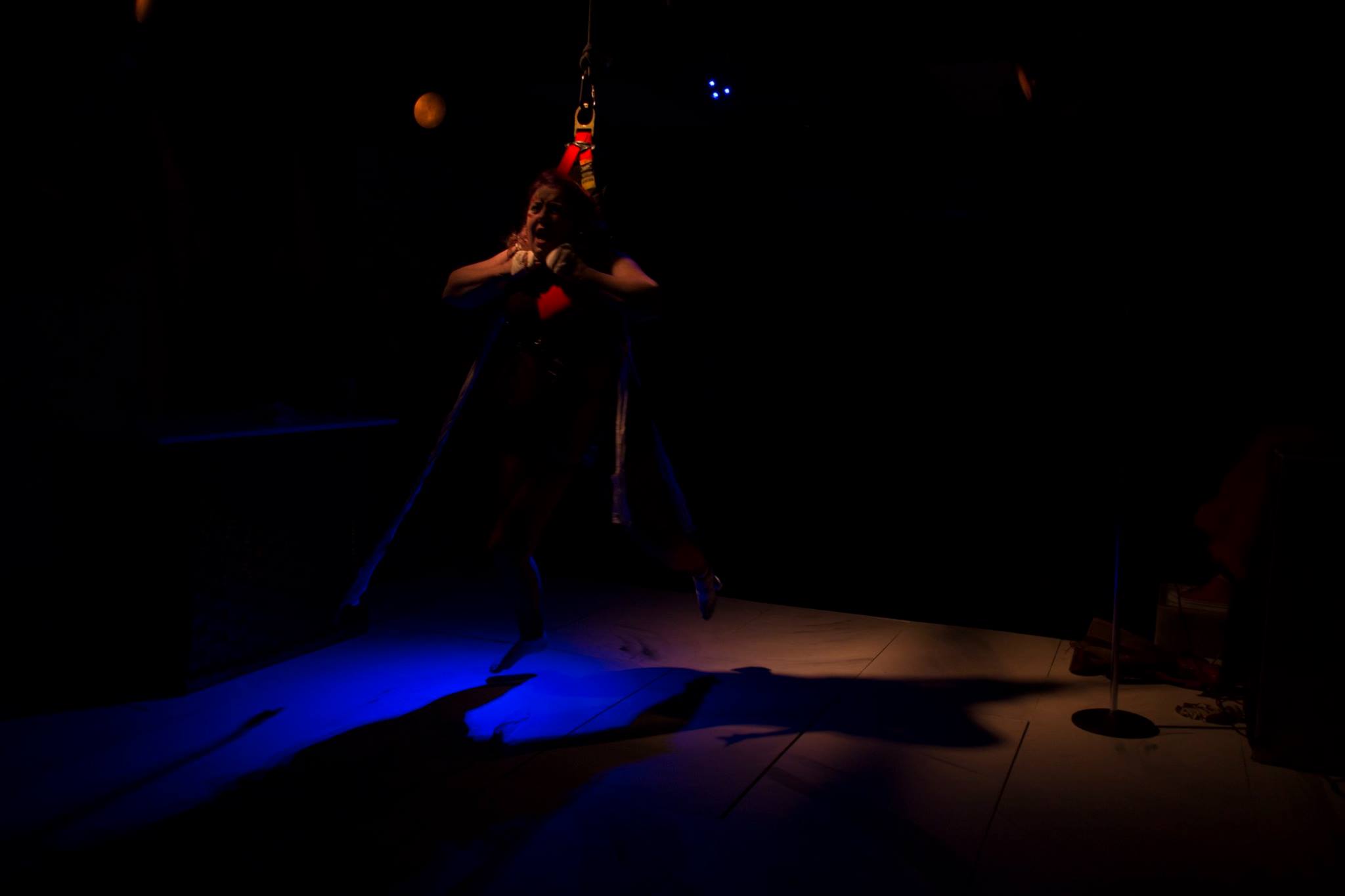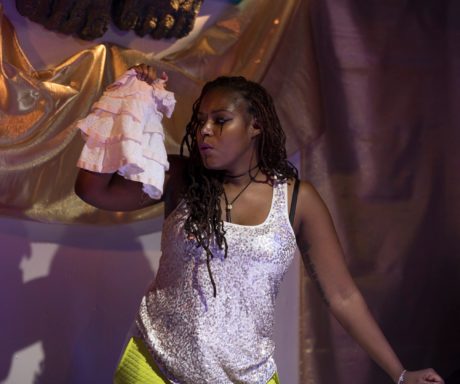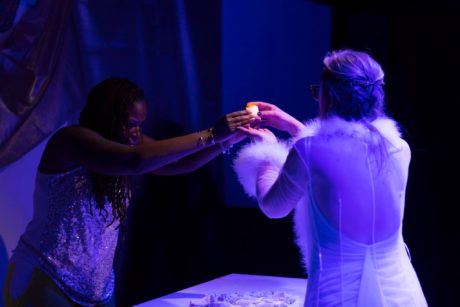Venus Theatre’s staff don’t open the house until immediately before The Powers that Be begins, presenting audience members, as they take their seats, with the evening’s most arresting image, writer/director/performer Deborah Randall in a literal physical enactment of the “double bind” – damned if you do/damned if you don’t – in which her play pictures women being enmeshed.

The six characters – archetypes, really, and so identified in the program – are not about to accept that position without a fight. To escape the double bind, they must name and confront what threatens their souls and very lives.
In an explicit echo of the 1980s, one of Randall’s 18 lyrics in the show (music by Alan Scott) proclaims “Fight the Power.” Anansi (Myrrh Cauthen) delivers that number, as well as the revenge-filled “Fangs” (she’s not a Chita Rivera kind of spider) and “Monster’s Ball,” full of contempt for men who compensate for their own inadequacies by misusing women. In a reversal of men’s disdain for female bodies that don’t measure up to male standards, Randall’s lyrics refer to “little dicks,” and a “thick lard man ass,” as well as, in an allusion to the movie Monster’s Ball, asking why the “spindliest oldest ugliest white man/Gotta get the most beautiful woman in the world?”
Randall plays Anu, described as a “Mother Earth” figure, who through much of the play sits on a higher platform than the rest of the cast, in what initially seems like calm control, taking the stage for two of the show’s best songs. “Emaciation Nation” imagines the being of a refugee perishing in the Southwest desert. “Lust and Escape/Bar Song,” about a girl longing to run from a dead-end life but unable to take her eyes off a band member, is a lyric a country artist might compose, if country writers took women more seriously.
Anu’s relative equanimity explodes in “Spiraling Down” – “THAT’S IT!!, NO MORE!!, I can’t stand it.” It’s fair to mention here, as Randall does in her press statement, that this play, perhaps especially this moment in the play, is intensely personal. She relates that, three years ago, her dear friend Tricia McCauley was raped and murdered, and writing this script became one of Randall’s ways of healing from that trauma, of remembering her friend for how she lived, not just the darkness in which she died.
I saw the play on Saturday, coincidentally the UN’s International Day for the Elimination of Violence Against Women, during which there were demonstrations around the world demanding measures to combat femicide (“Only 32 Femicides Until Christmas,” said one sign in Paris, there having been 137 such murders in France this year).

It is this deadly violence, and the physical and spiritual violence of sexual abuse, with which the characters contend. In a striking series of monologues, Amina (Jasmine Brooks) powerfully indicts those who have killed her child and those who abuse women and children (specifically Joaquin Garcia, the recently jailed head of the Guadalajara-based Light of the World megachurch chain). One of the strongest passages in the script is her condemnation of the female collaborators with male abusers (a number of women were arrested as accomplices to Garcia). Mothers or others who dismiss or disbelieve a girl’s stories of abuse likewise enable the crimes.
Benten (Amy Rhodes), generally presenting a more cheerful countenance, sings of the “Loyal Wife” who cannot escape the romantic dream of womanhood, white picket fence and all. Rhodes also doubles as the show’s set and lighting designer. Inari (Rikki Howie) breaks through Anu’s attempts to prevent her from singing her song, about the power of raw sexual desire (“Rough Love”).
The youngest character, Eire (Camryn Shegogue), able to question both herself and the older characters about their assumptions, sings of the real “Light of the World” exposing the truth. This is a uniformly fine cast, each member of which is a strong, memorable actor and singer.
For a show on a deeply serious subject, The Powers that Be contains a good deal of humor. “Permission” and “If I Had a Man Dick” are a hoot with an edge (fans of Fiddler on the Roof can easily work out their provenance). Randall ends the show on an upbeat, deliciously macabre, note with the celebratory ensemble number, “Jeffrey Epstein is Dead.” One less monster in the world.
A new play receiving its premiere, The Powers that Be touches on a host of current issues: immigration, Donald Trump, mass shootings. The characters place votive candles around the stage as each 2019 gun massacre is named. The candlelight, and the spirit of the scene, brought to mind a remembrance service I attended last Wednesday for the 21 trans women of color murdered in the U.S. this year.

In addition to her other duties, Randall designed the costumes, differentiating the characters by color: bright red for herself, diaphanous blue for Benten, glittery silver top for Amina, etc. Neil McFadden’s sound design, in addition to augmenting on-stage instrumentalists as accompaniment for the songs, provides ambient sound backgrounds for Amina’s monologues.
The Powers that Be is not the place to look for conventionally naturalistic character development or a straight-ahead narrative thread. It aims to give varied voice to women who are trapped by their own or their culture’s expectations (Eire sings of women being trapped “by the label of love”) and the often malign power of men, while sometimes not helping one another. It does well at expressing the rage needed to break those bonds.
In so doing, it leaves many questions unanswered and, often, unasked: What path does one follow from justified anger? What is the bridge from rage to resolution? Where and how do empathy and compassion enter the picture? How do we recognize and handle the nuances of tenderness and caring between men and women and among women? What of power dynamics among women? How do you affirm yourself, how do you grow bigger than your pain, no matter what and in spite of everything? Nothing easy there.
The play’s nods in the direction of some degree of resolution are subtle. There are hugs among the women toward the end of the show and, in a counterpoint to Anu’s “Spiraling Down,” Benten offers the thought that “For the sacred times upon us/I’m spiraling up/For those who will not see/Stay in their light/Like candles/This darkness/Cannot stand/I’m spiraling up/Sisters of the/ Here and now/Sisters take my hand.” Beyond that, pondering the unanswered questions is left to the audience, or perhaps Venus Theatre’s next “iteration.” Neither is a bad place for those questions to rest.
Running Time: Two hours, with no intermission.
The Powers that Be plays through December 15, 2019, at Venus Theatre, 21 C Street, Laurel MD. Purchase tickets online.





A finely observed and gorgeously written review that does due justice to the Venus Theater production. Thank you, Bob Ashby. Keep writing!